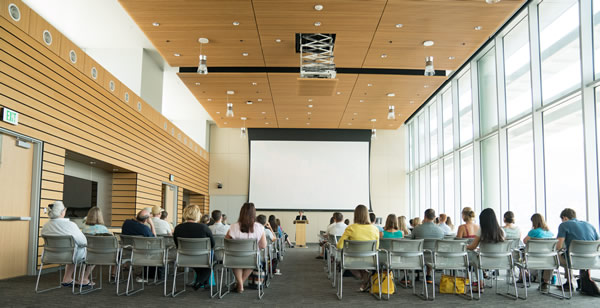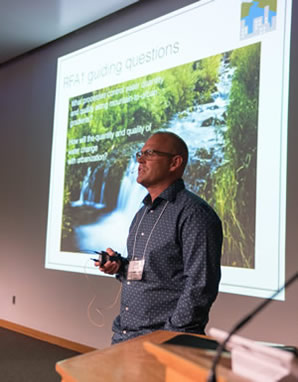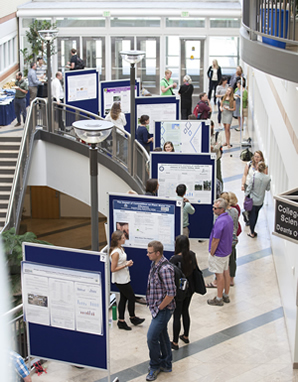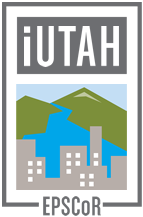Education and Outreach News
December 20, 2017
WSU Symposium Showcases Student Research
Amid the hectic schedule of finals week, some Weber State University students made time in their busy schedules to present their research findings from participation in iUTAH’s summer iFellows undergraduate research fellowship program and faculty Research Catalyst Grants (RCG). The event was co-hosted by Carla Trentelman, associate professor of Sociology, and Dan Bedford, professor of Geography and WSU honors program director, and attended by students, faculty, administrators, and friends of iUTAH.
This year, two WSU undergraduates, Maggie England and Mike Fowles, were part of a cohort of 15 students that participated in the 11-week summer research experience. During that time, they were actively involved in iUTAH fieldwork, research, and analysis. Working with faculty and student mentors, these students learned about the challenges and solutions needed to sustain the state’s water supply over the next few decades and the environmental impacts that we have on bird species, and aquatic habitats in local watersheds.
Students presenting research at the WSU symposium include Maggie England, Mike Fowles, and Rebekah Holt. Past participant attendees included Cynthia Elliot, 2016 iFellow, William Soule, Summer Institute mentor, and Kassandra Sqrow, who participated in both an RCG and as a Summer Institute mentor.
Rebekah Holt worked with faculty mentor Bridget Hilbig, assistant professor of botany at WSU, on a RCG project focused on enhancing soil complexity to improve sustainable urban agriculture. They constructed a rooftop garden, adding Arbuscular mycorrhizal fungi (AMF) native to Utah to soil and measured growth responses in pepper plants. While the AMF plants grew better, challenges with the location and the growing boxes limited the growth of viable crops. Future research will involve changing the plants from peppers to parsley, and making adjustments to the boxes and watering schedule.
“Ever since iUTAH began, our colleagues at Weber State have been terrific supporters of undergraduate research,” said Mark Brunson, iUTAH Education, Outreach and Diversity director and professor in the Department of Environment & Society at Utah State University. “Our research faculty have greatly enjoyed working with Weber students, and the work they’ve done has made a real contribution.”
In the five years that WSU has partnered with iUTAH, 41 students have been involved in undergraduate research, including 14 iFellows, 7 Summer Research Institute mentors, and 24 student RCG researchers.
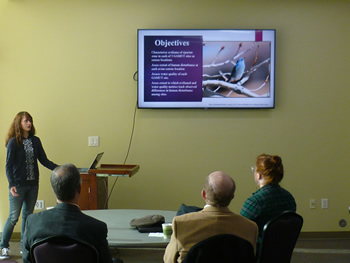
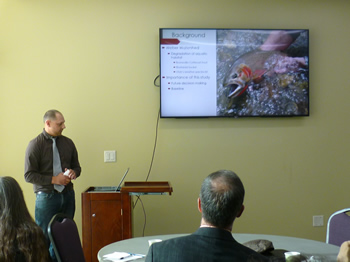
November 21, 2017
Growing a Water-Wise Citizenry
Part of iUTAH’s aim is to provide learning opportunities and foster experiences that promote water education for students of all ages. We have worked with our museum partners to create both stationary installations and traveling exhibits reaching well over 400,000 people at 412 public outreach events in the past five years. This number is still growing since many of these displays are still in active use.
October 5, 2017
Classroom Lesson Leads to Publication
Former iUTAH postdoctoral researcher Erik Oerter has collaborated with Molly Malone, Louisa Stark, and Gabriel Bowen, and others to publish the paper “Every apple has a voice” in Hydrology and Earth System Sciences, a peer-reviewed open access journal.
In the summer of 2016, Oerter served as a mentor in the Summer Research Institute (SRI), a program supported by iUTAH from 2013 – 2016. The program offered students and teachers the chance to become scientists for one week each summer. He designed a one-day water science activity for the program, including lecture, a hands-on lesson about isotopes, food sourcing, and the water cycle, and a computer lab exercise. Participants, which included high school students, undergraduate students, and high school science teachers, then turned what they learned into a poster presenting their research results.
The effectiveness of the activity was assessed through pre- and post-lesson tests, as well as participant surveys. While the lesson was effective at teaching the basics of stable isotope hydrology and the water cycle, the computer lab needed to be more specifically tailored to each participant’s abilities. Oerter felt that he learned much from the teachers while discussing his lesson. A highlight of the week was “seeing the light bulb go on” in the students as they understand complex concepts while creating their posters.
Oerter is currently working as a postdoctoral researcher at Lawrence Livermore National Laboratory in Livermore, CA. His research focuses on the intersection of hydrology and geochemistry, applying the isotope hydrology expertise gained through iUTAH to a broader set of national issues.
Originally, SRI was designed as part of CI-Water, a prior NSF EPSCoR-funded project that brought collaborating institutions in Utah and Wyoming together to address water issues in the West. Through the guidance of Director Louisa Stark and Senior Education Specialist Molly Malone from the Genetic Science Learning Center at the University of Utah, the program engaged 96 high school students and teachers, and undergraduates in 13 diverse research projects reflecting iUTAH's cross-disciplinary approach over four years.
Full study of the article is available below:
“Every apple has a voice: using stable isotopes to teach about food sourcing and the water cycle.”
Authors: Erik Oerter, Molly Malone, Annie Putman, Dina Drits-Esser, Louisa Stark, and Gabriel Bowen.
Related news article:
Collaborative Paper wins HESS Best Paper Award
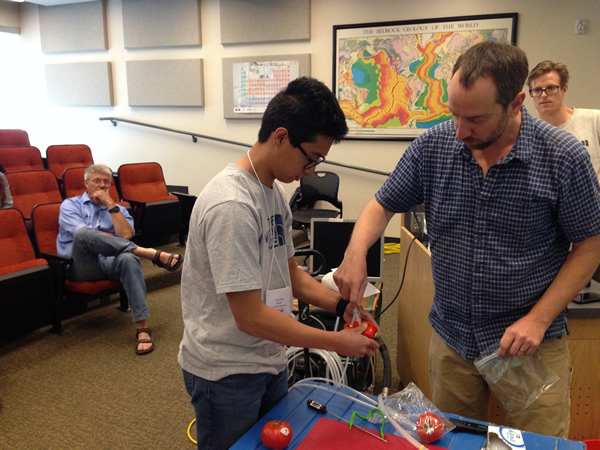
Credit: Molly Malone, GSLC/University of Utah
August 28, 2017
Changes in Utah Water Watch Staff
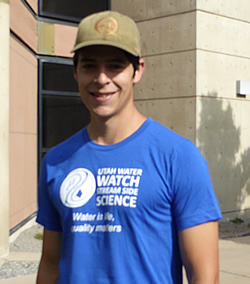
In June, Utah Water Watch (UWW), a Utah State University Water Quality Extension program, said goodbye to co-coordinator Eli Robinson. While working for Utah Water Watch, Eli spearheaded UWW’s Harmful Algal Bloom (HAB) program. This program has been successful in working with citizen monitors to assist the Utah Department of Environmental Quality’s Division of Water Quality in catching HABs before they release toxins and cause potential harm to people and animals. The UWW community will miss Eli’s organizational expertise, sense of humor, and creativity, and wishes him well in the future.
With this change, Cade Andrus has joined UWW as the new co-coordinator. He is a 2017 graduate of the Quinney College of Natural Resources at USU and has a degree in environmental studies along with a strong interest in sustainable development. While in this new position, he hopes to reach a broader audience for water quality education and citizen monitoring. Cade’s diverse background will bring new insights and ideas to the program.
In order to continue supporting and growing programs, UWW has added additional staff this season, including USU students Jose Pacheco, a senior in conservation and restoration ecology, and Hannah Johnson and Cole Patton, who are both incoming freshman and Quinney scholars studying conservation and restoration ecology.
UWW co-coordinator Ellen Bailey, based in Salt Lake City, works with watershed partners to develop advanced monitoring (Tier 2) volunteers in assisting with state monitoring needs, especially in measuring the effectiveness of projects to improve water quality. In her presentation this past July at the iUTAH Symposium, she shared the following numbers on the program’s successes since 2012:
-
103 training events
-
1,025 volunteers trained
-
250 sites monitored overall in Utah
UWW maintains an active citizen science group supporting water stewardship in the state of Utah, including 100 active volunteers this year with 23 specializing in Tier 2 monitoring, and is a program that iUTAH is proud to partner with and support.
August 25, 2017
iUTAH Symposium Celebrates Five Years of Successes
The final iUTAH Annual Symposium and Summer All-Hands meeting was held over two-days, July 13 -14, on the campus of Utah State University in Logan UT. It was a time for reflection, sharing of successes and outcomes, and celebrating five years of collaborative research, training, education, and outreach for Utah’s water future.
Thank you to all the iUTAH EPSCoR collaborators, partners, and friends who joined us as presenters, participants, and celebrants. For those of you that could not be in attendance, we wanted to fill you in on what you missed, along with personal reflections and comments from invited speakers.
Over 120 researchers and educators from universities, municipalities, and governmental agencies, including industry partners and non-profit organizations, came together on the first day to discuss successful water science programs conducted across the state. iUTAH team leaders talked about critical outcomes and lasting impacts in research on water quality and quantity, social and engineered water systems, and modeling and forecasting of future water supply and demand in the state. These updates were followed by short personal experience stories from five active participants whose research or career paths were altered by involvement in the iUTAH project.
Lunch was held in the company of this summer’s iFellow undergraduate researchers who presented posters of their research and answered questions about what they learned. The symposium concluded with 40 talks in seven concurrent sessions on a broad spectrum of topics. It was exciting to hear about the many ways that iUTAH research, education, and outreach has reached the lives of Utahns across the state.
Friday’s all-hands meeting provided a half-day forum for reflection and celebration. Talks from our three invited speakers kicked off with the Head of NSF EPSCoR, Denise Barnes. She listed the project’s many accomplishments, including GAMUT, career catalyst, personal transformations, collaborative capacity, meaningful relationships with state and municipal agencies, and the surveys and social science data— all key components that have been achieved over five years, and are so valuable to Utah. She “encourages the iUTAH team to keep the collaborative momentum going, and continue to build on the project's success,” and closed by saying “you make NSF EPSCoR look good.”
Next, Tami Pyfer, Education Advisor for the Utah Governor’s Office reflected on her experiences growing up with her dad, a Range Scientist and USU alumnus, including research trips to Ekalaka, MT. Pyfer reflected on our project by saying:
“Governor Herbert continually highlights the need to ‘unite and focus’ our efforts to solve problems and improve the lives of the citizens of Utah. The iUTAH project is a perfect example of what can happen when we truly unite and focus on important issues. It exemplifies the collaboration that is happening between education, government and community organizations, as well as the innovation happening within these entities. As a state we are moving more and more toward evidence-based policy making - which is a good thing - and the work of the iUTAH project provides great information and resources that can be used by local and state policymakers.”
The third speaker of the day was Tamara Goetz, Executive Director of the UTAH STEM Action Center, who started her keynote address with a little history, noting that:
"The iUTAH project has been a fun story to watch unfold. When we first found out that we were qualified to become an EPSCoR state, it was met with mixed emotions. There were some who saw it as an opportunity to secure funding for which there were fewer competitors. However, there were others who were dismayed. They felt that it highlighted our inability to secure federal funding and labeled us as a low performing state. Fortunately the desire to collaborate to address a critical issue, such as water management, in our state prevailed. This positive, "can do" attitude is what has made the iUTAH project a success."
Goetz added that:
"I have been impressed with the iUTAH team and their desire to look beyond research and data generation. They made a commitment to look "outward" and engage a larger stakeholder group in the conversation. They brought the issues to the community, creating dialogue around water use and sustainability, through public perceptions studies and public exhibits such as the one at The Leonardo. They were self-reflective and acknowledged that they needed to improve their own public communication skills and worked with groups like the Alan Alda Center for Communicating Science to help researchers do a better job of communicating the value of their work to those that were not directly involved in research."
iUTAH Project Director Michelle Baker challenged everyone in the room to keep the ball rolling, with regards to collaborations and involvement. While the iUTAH project office will no longer host regular All-Hands meetings, she said that we should take every opportunity to organize iUTAH gatherings associated with other events in the state. Two upcoming examples mentioned were the Salt Lake County Watershed Symposium and Weber State University’s Intermountain Sustainability Summit. This message was further reinforced by a pre-recorded video message from university administrators from across the state, prior to the awards and recognition portion of the morning.
In closing, the iUTAH EPSCoR project has been approved for a one-year no cost extension, through July 2018, and looks forward to connecting with each of you and continuing our valuable research, education, training, and outreach collaborations in the coming year. Our website and newsletters will continue to be updated with achievements, happenings, opportunities, and events of interest to our collaborators. We welcome you to stay in touch and continue to let us know what you are doing.
